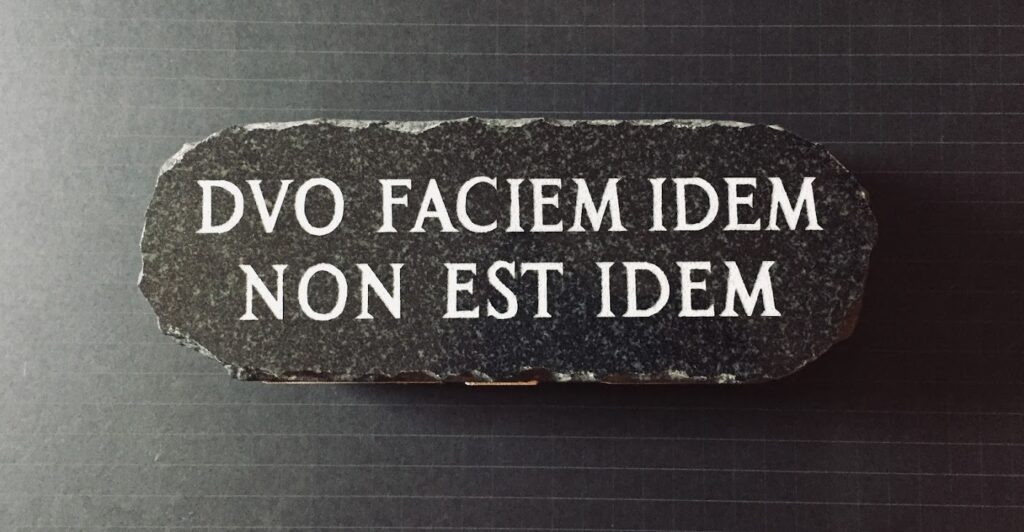Identify Your Core Competencies
by William S. Frank, President/CEO of CareerLab®

Photo by Silvan Arnet
Every mid-career professional has 6-12 big areas of capability. In the past they were called skills, but today’s buzzword is “competencies” or “core competencies.” A recruiter of employer may ask you to name your core competencies. If so, they’re asking you to identify a few of these general areas of capability. Take time to identify the top 6-12 that apply to you, then prioritize them. Which is first most important to you, second most important, and so on?
Naming competencies is some of the hardest resume thinking we do, because being one-of-a-kind, everyone’s competencies are different.
A granite sign in my office says, “DVO FACIEM IDEM NON EST IDEM.” Meaning, “Two people can do the same thing, but it’s not the same.” No two architects will design it the same, no two trial lawyers will use the same arguments. You get the idea. We’re all different and special.

Gift Courtesy of Graphic Designer T. Craig Lincoln
If we dig deeply, there are hundreds of “core competencies. Everyone’s list is different.
Competencies are evolving to match job titles. Did you ever think “Chief Storyteller,” “Algorithm Bias Auditor,” “Vice President of Corporate Social Responsibility,” or “HR Data Detective” would be job titles in the corporate world? Neither did I, but things change. Would you believe that one person held two of these job titles in a Fortune 500 company, back-to-back? He did.
An Internet search will find forward-looking competencies, things the world of work requires today, not yesterday, and that’s helpful. Things like:
- Learning Agility
- Conceptual Flexibility
- Situational Adaptability
- Commercial Mindset
- Connection and Belonging
I’ve listed 29 competencies below, but each is a broad category, too generic for our purposes. So rather than saying “Finance,” which is too general, use “Pre-IPO Finance & Accounting,” or language that is more specific.
Not This
But This
Finance
Pre-IPO Finance & Accounting
Legal
Commercial RE Contract Negotiation
Leader
Lead large teams (18 Direct, 2,100 Indirect)
P&L Responsibility
Multi-unit P&L Responsibility to $2.1B
Manager
Recruit, Develop & Motivate Talent
These are the broad categories to get you started. But remember, you must sharpen them up and power them up considerably.
1. Art
2. Business Management (cost reduction / revenue increase)
3. Communication
4. Community Service / Social Responsibility
5. Computer / Information Technology / Informatics
6. Conflict Resolution
7. Construction / Facilities
8. Consulting
9. Counseling / Caregiving
10. Entertainment
11. Finance
12. Human Resources Management (recruitment, training, retention)
13. Leadership / Managing / Administration
14. Legal
15. Library / Records / Knowledge Management
16. Media
17. Negotiating
18. Operations
19. Planning / Strategic Planning
20. Political Skills / Schmoozing
21. Presentations / Speeches
22. Quality Assurance / Quality Control
23. Research & Development
24. Sales and Marketing / Advertising and Public Relations
25. Science / Innovation / Patents
26. Special Skills [Pilot, etc.]
27. Teaching
28. Technology
29. Writing / Editing / Publishing
Core competencies link to your accomplishments.
Use your list of work achievements to help you remember, identify, and develop your list of core competencies. Your achievements should mirror your competencies, and vice versa.
Example: if a resume bullet reads “Saved $287,000 by renegotiating 10 software technology licenses,” then you could consider using “Contract Negotiations” as a competency. And if you list “Contract Negotiations” as one of your twelve skill areas, your resume should show several examples. Otherwise, why is it listed?
You’ll see examples of core competencies below. Use the examples as just that: jumping off points. Don’t copy them word for word just because they sound neat. Almost anyone could use “Strategic Thinker. Critical Thinker. Problem Solver.” But is that really you?
“What is your greatest gift?” is one of my favorite questions. When I asked a CEO the question, he said, “I never met a problem I didn’t like.” Wow! That’s a competency, and one I sure don’t have. I’ve met lots of problems I didn’t like.
The more your resume reflects you, the real you, not the imaginary one, the more it works.
One hint into your competencies can come from The Clifton StrengthsFinder, developed by the Gallup organization. You can take it online, but the book StrengthsFinder 2.0 is cheaper, and I prefer it. This assessment names 34 business strengths and gives you your top five.
Mine are: Strategic, Maximizer, Achiever, Relator, Learner. The StrengthsFinder named them for me, without weeks of soul-searching. It will do the same for you.
Being strategic is being able to see around corners, to see the future. A maximizer is someone who takes good things and makes them great. You can see how these competencies tie right into my work.
Yours will too.
Examples of Core Competencies for The Million Dollar Resume. ::Return to index of articles.